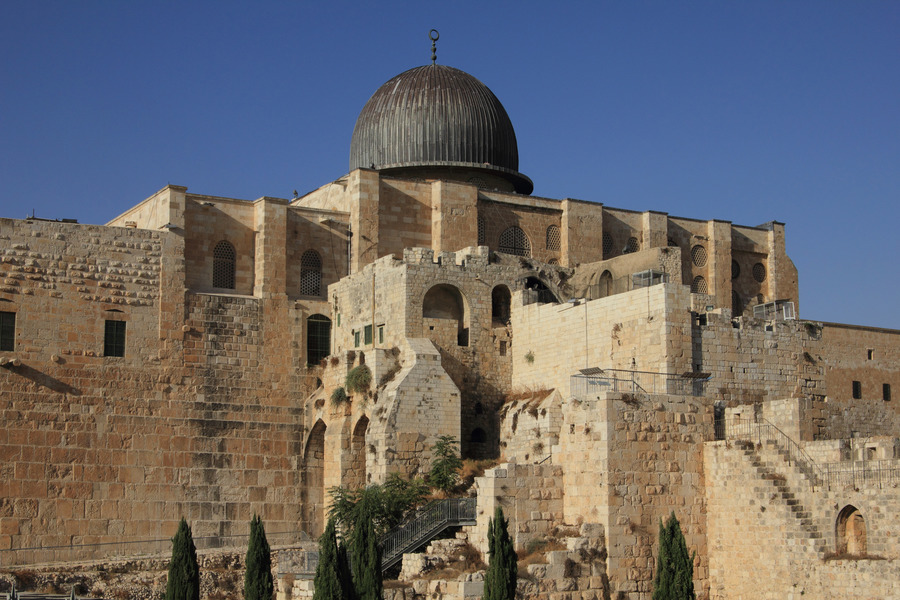
Al-Aqsa Mosque: The Sacred Journey Through History and Faith
Al-Aqsa – The First Qibla
By: Javid Amin
The Al-Aqsa Mosque, nestled within the captivating cityscape of Jerusalem, stands as a symbol of profound historical and spiritual significance for Muslims worldwide. This magnificent sanctuary is more than just a place of worship; it is a testament to the intricate tapestry of faith, history, and resilience that defines Islam. The journey through Al-Aqsa’s history is, in many ways, a journey through the annals of Islamic heritage, connecting believers with their Abrahamic roots.
Al-Aqsa – The First Qibla
At the heart of Al-Aqsa’s significance lies its historical link to the earliest prophets, particularly the great patriarch Abraham. The Quran explicitly references the significance of Al-Aqsa in the Night Journey and Ascension (Isra and Mi’raj), an extraordinary event where the Prophet Muhammad was transported from the Kaaba in Mecca to Al-Aqsa in Jerusalem. This miraculous night voyage is recounted in the Quran, emphasizing the unique status of Al-Aqsa:
“Exalted is He who took His Servant by night from al-Masjid al-Haram to al-Masjid al-Aqsa, whose surroundings We have blessed, to show him of Our signs. Indeed, He is the Hearing, the Seeing.” (Quran, Surah Al-Isra, 17:1)
This verse encapsulates the divine connection between the two holy sanctuaries – the Kaaba in Mecca and Al-Aqsa – underscoring their sanctity. It also signifies the continuity of prophethood from Abraham to Muhammad.
The Prophetic Footsteps at Al-Aqsa
The link between Al-Aqsa and the esteemed line of prophets is of paramount importance. Prophet Ibrahim’s presence at Al-Aqsa is a crucial part of this connection. Islamic tradition holds that he, along with his son Isma’il, played a pivotal role in its construction. The Quran alludes to this in Surah Al-Baqarah, emphasizing their devotion:
“And [mention] when We made the House a place of return for the people and [a place of] security. And take, [O believers], from the standing place of Abraham a place of prayer.” (Quran, Surah Al-Baqarah, 2:125)
This reference underscores Al-Aqsa’s status as a spiritual anchor. As the prophets journeyed through this holy land, the foundations of faith were laid, connecting humanity with their Creator.
The Isra and Mi’raj – A Night of Ascension
The miraculous Night Journey and Ascension marked a turning point in the life of the Prophet Muhammad, peace be upon him. This divine voyage involved an ascent through the heavens, where the Prophet encountered various prophets and received instructions for the Islamic prayer. The pinnacle of this celestial journey occurred at Al-Aqsa, a place chosen by Allah Himself.
The Quran not only alludes to this ascension but also highlights the power of Allah and His divine guidance:
“And he [the Prophet] was at a higher level in the horizon. Then he approached and descended and was at a distance of two bow lengths or nearer.” (Quran, Surah Al-Najm, 53:7-9)
The depiction of the Prophet’s closeness to the Divine emphasizes the sacredness of Al-Aqsa and its role as a place of spiritual elevation and divine connection.
Al-Aqsa Through History
Al-Aqsa’s history is marked by a tapestry of empires and dynasties that have governed Jerusalem. From the Rashidun Caliphate to the Umayyads, Abbasids, and beyond, the mosque has remained a central element of the Islamic world. It has witnessed both moments of grandeur and periods of turmoil.
During the Islamic Caliphate of Umar ibn Al-Khattab, he ensured the protection of Al-Aqsa as part of the Treaty of Jerusalem, solidifying its place in the Islamic legacy. As a result, Al-Aqsa became a center of learning and spiritual development.
The Modern Significance and Challenges
While Al-Aqsa holds immense importance in Islamic history, it is also a significant religious site in Judaism. This interfaith complexity, along with political and historical factors, has given rise to conflicts and tensions. The modern-day Al-Aqsa is at the heart of the Israeli-Palestinian conflict, leading to ongoing disputes, clashes, and access issues. The contestation of control over Al-Aqsa further complicates the political landscape of the region.
Protecting Al-Aqsa’s Sanctity
As believers, it is our responsibility to honor and protect the sanctity of Al-Aqsa. It is a symbol of unity, not only among Muslims but also among all those who revere the teachings of the Abrahamic faiths. The Quran reminds us of our duty to protect the sacred:
“And who are more unjust than those who prevent the name of Allah from being mentioned in His mosques and strive toward their destruction. It is not for them to enter them except in fear. For them in this world is disgrace, and they will have in the Hereafter a great punishment.” (Quran, Surah Al-Baqarah, 2:114)
The respect and preservation of Al-Aqsa’s sanctity should be at the forefront of our collective consciousness.
The Global Implications
Tensions surrounding Al-Aqsa reach far beyond the city of Jerusalem. The religious and political significance of the mosque can impact not only the Israeli-Palestinian conflict but also relations between Israel and neighboring Arab and Muslim-majority countries. The protection of Al-Aqsa remains a common cause for many.
The Way Forward
In a world filled with complexities, Al-Aqsa serves as a reminder of the unbroken chain of prophethood and the unity of faith. Its history is a testament to the strength of the human spirit and the role of religion in our lives. The path forward should include dialogue, diplomacy, and a shared commitment to preserving Al-Aqsa’s sanctity.
Bottem-Line: Al-Aqsa Mosque stands as an enduring symbol of faith, connecting the hearts of believers to the prophets who walked its hallowed grounds. Its significance transcends borders, serving as a beacon of hope and unity in a region marked by conflict. As the faithful, we must honor its sanctity and seek peaceful solutions to protect this sacred space, ensuring that Al-Aqsa remains a place of worship and spiritual elevation for generations to come.

